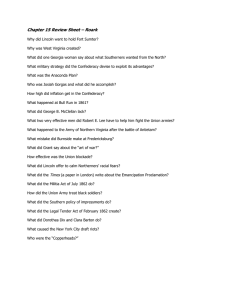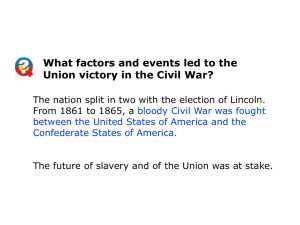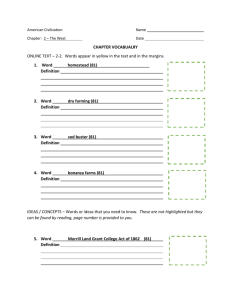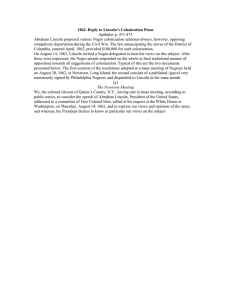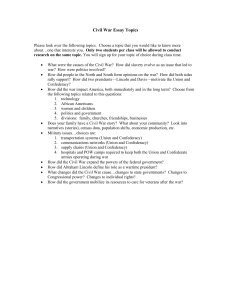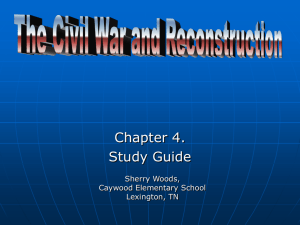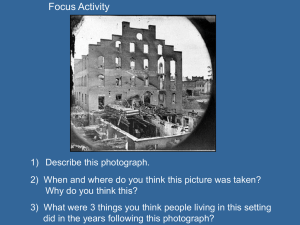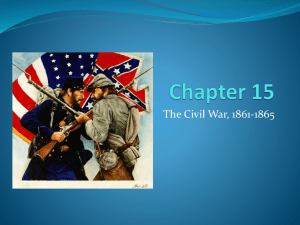CWHomeFront1
advertisement
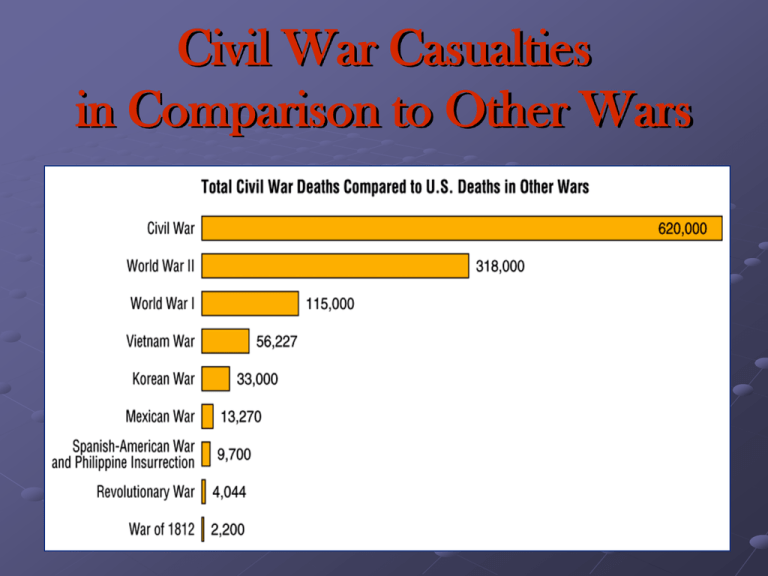
Civil War Casualties in Comparison to Other Wars Home Front Politics Preview of Main Points Keeping control of the home front can be just as important as fighting battles in a war. The Civil War forced both the North and South to confront many volatile issues internally. Politics in the SouthThe South had many obstacles to overcome because it also had to set up its own government. Ironically, the single greatest issue the South rallied around, state’s rights, became a major roadblock in the Confederate’s attempt to wage war. War demands central control and direction rather than a loose organization of government, a confederacy to make decisions. No matter what, the South needed to make the most out of its resources because it had so few compared to the North. Why the North Won (or Why the Confederacy Lost) “The Army of Northern Virginia has been compelled to yield to overwhelming numbers and resources." Robert E. Lee "God is always on the side of the heaviest battalions" Railroad Lines, 1860 471 total, 19 CSA, 452 union Resources: North & the South Government -South passed a constitution similar to the US one, but it recognized state’s rights and slavery. -The South had continuous disputes within itself on how to exercise power. “Died of States’ Rights” z Joseph Brown, Georgia Governor Zebulon Vance, North Carolina Mobilizing for War in the South -April 1862 passed a conscription (not a draft) white men 18-35 -Extend service to all volunteers for 2 more years -Age rose to 45 after Antietam -50 at the end of the war 90% of all eligible white men fought in the war! All Southerners were not Confederates How many southerners fought for the Union? Southern slaves Border state whites Confederate state whites 150,000 200,000 100,000 Total 450,000 1/3 of all southerners who fought in the Civil War fought for the Union Economy -Determined how much goods should be produced -Took ownership of RR from private individuals -Farmers had to give 1/10 of crop to the government- still food shortage was a serious problem for the South -Personal income tax Financial Strength Sources of Revenue Bonds Taxation Paper Money CSA 35% 5% 60% USA 66% 21% 13% Indices of Prices and Real Wages During the Civil War(1860=100) Union Confederate Year Prices Real Wages 1860 100 100 1861 101 100 1862 113 93 1863 139 84 1864 176 77 1865 175 82 Prices Real Wages 100 100 121 86 388 35 1,452 19 3,992 11 9,200 approx. Abroad No one in Europe formally recognized the Confederacy -Britain allowed the South to build 11 privateer ships to raid Union shipping South’s #1 hope was to get Britain to ally with the South by cutting off all cotton trade with Britain, “cotton diplomacy,” failure because of British Abolitionist Politics in the North Active Congress with no Southern opposition passed the: 1861 – Morrill Tariff Act-higher import tax 1862 – Homestead Act- 160 acres free land 1862 – Legal Tender Act- a national currency, called the greenback. 1862 – Morrill Land Grant Act- sale of land for state colleges, like OHIO STATE, GO BUCKEYES #1 1862 –Emancipation Proclamation (Presidential) 1863 – Pacific Railway Act- transcontinental railroad (The effects of these laws were not truly seen until after the Civil War! Remember these laws!) All these acts strengthened the power of the federal government. •Lincoln resorted to extreme measures to quash protest. •The Union had to exercise a firm hand with slave states that did not secede to keep their loyalty. •Lincoln put Kentucky under martial law to secure it. •Also Lincoln suspended the writ of habeas corpus, the right to be charged with a crime when arrested, in Latin it literally means produce the body •Ex Parte Milligan- Supreme Court case that ruled military trials of civilians were illegal unless the civil courts were inoperative or the region was under military rule. •In all, more than 13,000 Americans were arrested and jailed because of their political opposition to the government. •Lincoln’s main goal was to preserve the union. Emancipation Proclamation -Legal document that freed the slaves in areas that were rebelling against the Union -Slaves seen as contraband, property seized during wartime -Dramatically changed the war into a fight to end slavery -Thousands of African Americans rushed to join the Union army after this was announced Opposition to the War The North also issued a draft for the Civil War. Riots erupted in New York City in protest. Copperheads = Democrats in congress that opposed the war effort Ken Burns Video Disc 3 The Universe of Battle Bottom Rail on Top 59 to 1:12
